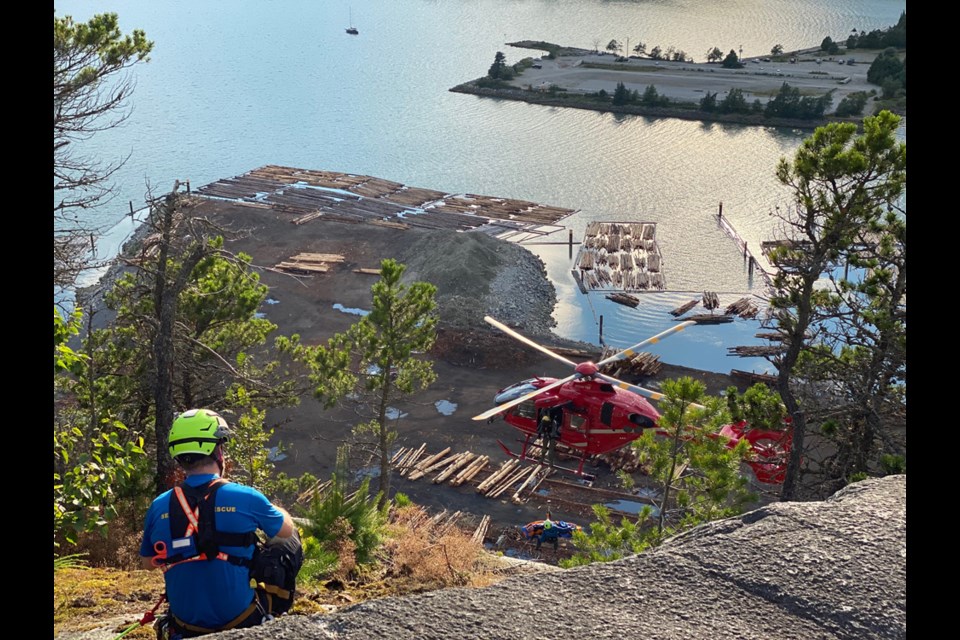It was a busy long weekend for Squamish Search and Rescue.
On Saturday (Aug. 5) volunteers were called out on five calls.
"Some concurrent and some simultaneous calls," SAR manager B.J. Chute told The Squamish Chief.
"It started at around 7:15 a.m. in the morning for the overdue hikers at Watersprite Lake. And I think they finished up the last call well after dinner.”
Calls ranged from the missing hikers to someone with an injured leg on Sky Pilot to stuck climbers on the Stawamus Chief.
So far this year, local rescuers have fielded 78 calls which is nearly equivalent with the 74 calls up until this point in 2022 but fewer than the 100 up until this point in 2021.
Chute said while the type of calls SAR sees ebbs and flows, mountain bike injury-related calls seem to be on the uptick of late.
"It seems, at least anecdotally, that we are responding to more mountain bike injuries than we have in the past, as compared to hikers and climbers in sort of traditional call volume," he said.
"And why that is, I have no idea. I think just in general, recreationists ... are pushing out farther and farther. The more traditional places get busier and parking becomes an issue, I think that we're just seeing people go farther."
The farther distance means it is going to take SAR volunteers longer to get to those in need, he added.
"Anytime we have to drive a significant distance or fly a significant distance that just adds time to our responses," he said.
Thus, the message is that recreationalists heading out in Squamish should be prepared to take care of themselves for a time.
"We encourage people to be prepared and prepared to the point of self rescue," he said, adding that recreationalists do seem to be helping each other out in the backcountry.
"We know that people are coming together and assisting our members with these calls and it is quite humbling to see,” he said.
While Squamish's search and rescue organization is well equipped and has lots of dedicated volunteers for multiple rescues in the backcountry — even at the same time — access to helicopters due to wildfires in the province is a current concern.
"There was only one helicopter in the Sea to Sky for the long weekend. So, if we're using a helicopter for a response, then Whistler or Pemberton may not be able to use a helicopter or vice versa. So that's the thing that is a little bit more concerning than a lack of volunteers or a lack of equipment.”
Chute explained that Squamish SAR typically uses Blackcomb Helicopters and its members are long-line trained with them. A rescuer has to be trained with the specific helicopter company and can't just transfer that access to another helicopter company, Chute explained.
"As a technician, I'm not allowed to do long-line operations in [other] helicopters, because I haven't been trained with and signed-off with their regulations," he said, as an example of how access works.
Nancy Argyle of told The С����Ƶ that during heavy wildfire operations, there can be delays in receiving access to a helicopter for search and rescue organizations across the province.
"The С����Ƶ Wildfire Service is always helpful and willing to relinquish a helicopter for this purpose, but other factors often cause delays, such as pilots 'timing out' due to flying their maximum hours already or not being certified to hoist/winch with the actual search and rescue team that requires them," Argyle said in an email to The С����Ƶ.
"Sometimes, these delays are very lengthy and the fallback option then becomes 442 squadron out of Comox."
Argyle noted that helicopters are used more than 130 times each year by search and rescue organizations for what is called a Class D rescue, meaning when a winch or helicopter external transportation system is needed, and a further 450 times for transporting SAR members or patients.
"All helicopters — except 442 squadron — are privately owned and during peak seasons, such as during the summer when fighting forest fires, it can be challenging for search and rescue groups to secure one for their subjects," Argyle said.
For more on Squamish SAR, including an application to volunteer, .




